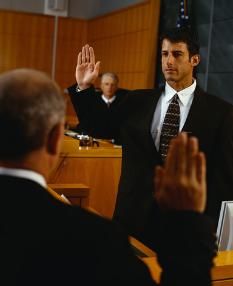 by Spencer Williams of Cordell & Cordell, PC
by Spencer Williams of Cordell & Cordell, PC
In any case there are opportunities that a client will be required to testify on the record. Depositions, motions, temporary (PDL) hearings and trial to name a few. Prior to any event that a party would be required to testify it is important to schedule a meeting in person with your attorney. It is important not to meet too far in advance as the “rules for testifying” may be forgotten, but any closer to the event may not allow the client time to practice and prepare.
The attorney will not provide a client with a response. It is unethical in most jurisdictions for an attorney to give their client the response. However, it is appropriate and expected that the attorney will help mold the response. This can be important to work with the attorney so responses can fit within the strategy and “theme” of the case being presented.
There are basic rules for testifying at any event.
Present yourself in a neat and conservative manner. Dress appropriately, but not too dressy. Avoid showing tattoos, piercing and be groomed.
Tell the truth. This is always necessary and the most important rule. An attorney can not knowingly present false evidence to a court. Further, in addition to committing the crime of perjury (and that is prosecuted, see President William J. Clinton and baseball player Miguel Tejada), if the lie is found out, the remainder of your testimony will not be believed. One practice regarding untruthfulness concerning property in a divorce is for the court to give the property in question to the other party and then divide the remaining property.
Speak in a clear voice. If you have something to say, say it. Do not mumble or speak under your breath. Do not allow someone else to interpret what you are saying.
Do not talk over anyone. If anyone else is talking in the courtroom, the witness should not be talking. If a witness is talking while a question is being asked, they are not listening to the question. Therefore, their answer is suspect. Further, it shows disrespect to the court. If there is an objection made by an attorney or if the judge begins speaking, stop your response, mid-word if necessary.
The brief pause. When asked a question, give a brief second pause. You can take longer if necessary, but give at least a brief one second pause before responding. This allows you to hear the question, make sure that the question is completed and you are not speaking over the attorney, gives time to formulate a response, helps avoid falling into a rhythm and last but not least allows your attorney to hear the question, consider it briefly and object to the question if necessary. If you respond before your attorney can object the effectiveness of the objection is substantially decreased.
“I don’t know” is an allowed answer. You are not expected to know everything. If you are asked a question that you do not know the answer, indicate to the court that you do not know the answer. Do not guess, do not estimate. The court will not want to hear that response to every question if logically you should know the answer. For example “Question: What is your name? response: “I don’t know” is not acceptable and would violate rule 2 above! In conjunction with this rule, if you do not understand the question, it is perfectly acceptable to ask that the question be asked again or rephrased.
Keep you emotions in check. In a domestic relations case, emotions can run very high. There are often allegations of inappropriate behavior by one party. Claims of mental cruelty, name calling , physical threats or even physical abuse. A tactic that some attorneys will take is to try and bring the emotions of the witness to a head. As a witness it is likely that your adrenaline will be flowing, you will be nervous and very emotional. Be professional. The court will understand that this is an emotional situation. Speak to the judge and ignore the rest of the courtroom.
Answer the question asked. It is very important to answer the direct question that you are asked. Do not assume you “know what the attorney is getting at”. The classic example of this rule is asking someone “do you know what time it is”? Ninety percent of people will respond by providing the actual time. The correct response is either “yes” or “no”. The question was not “what time is it”, the question was asking if the witness knew the time.
Following your meeting and before your testimony it is important to review certain materials and documents. Much of this maybe specific to your particular issues. However, in every case you should review at a minimum:
The pleadings. Know what you originally plead to the court. Why did you state certain facts? What is the evidence that has been acquired that now prove those facts?
Discovery responses. Review your interrogatory answers. Be consistent if possible with your responses. If something has changed and you must answer differently than in your written response, be prepared to explain clearly why your response has changed.
Deposition transcript: If you deposition was taken, review the transcript more than once. Just as with the interrogatory responses, be consistent with your responses. Look at the questions that are asked. Recall the opposing counsel, how he asked his questions, his tempo and demeanor. It is likely that he or she will be similar at trial.
References:
Michelle A. McCartney, Clayton, Missouri article “Preparing Your Witness with the Basics”

Spencer E. Williams is the Team Leader over St Louis, St Charles, Indianapolis and Arnold (Jefferson County, MO) offices of Cordell & Cordell, P.C. where he practices exclusively in the area of domestic relations. Mr. Williams has tried numerous cases dealing with complex custody issues, maintenance, business assets and personal asset division.

